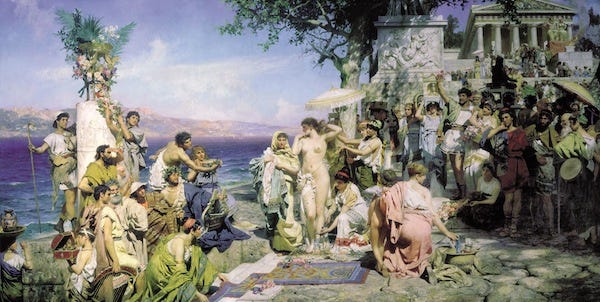FbF Book Club: The Final Pagan Generation (Watts, 2015)
Chapter 5 - Julian the Apostate, Make Paganism Great Again, Compromise, and the "Deep Empire"
Previous Entry - Chapters 3 and 4: Economic Reform, Political Stability, Court Intrigue, Institutionalization and Legalization of Anti-Paganism, Pragmatic Administrators
In 1999, Patrick J. Buchanan’s book “A Republic, Not an Empire” was published. He was readying the launch of his candidacy for the President of the United States on behalf of the nascent Reform Party after being drummed out of the GOP. Buchanan was sounding the alarm on the dangers of both US foreign policy’s growing appetite for intervening in conflicts around the world, and globalism and what it would do to the country’s economy and its citizens. His warnings went unheeded as the USA revelled in the triumphalism of the end of the Cold War and the initial economic benefits that came with it.
By 2016 the bill had come in. Lost wars with enormous price tags, de-industrialization, the hollowing out of the US economy, and the major cultural shifts upending previously held values caused a populist reaction that saw Donald Trump enter the White House after adopting Buchanan’s 2000 platform. “Make America Great Again” (MAGA, for short) was an attempt at a national restoration that was quickly sunk by the US Deep State. In a May 2017 Politico interview with Buchanan, the ex-candidate concluded that any attempts at restoration were already too late. US conservatives saw the changes happening and noted them, just like Buchanan did. But unlike Buchanan, they did not take them seriously enough until it was too late. They were too busy amassing personal wealth and coveted posts to do anything about it.
This brings us to the main subject of the fifth chapter of “The Last Pagan Generation”, Emperor Julian (known to us as Julian the Apostate), and his attempt to Make Paganism Great Again.
As we saw in the previous entry, Constantius managed to defeat rivals for his power and consolidated his position in Constantinople. This freed his hands to begin an actual anti-paganism policy that was put on hold while he had to share power (or was threatened by those very same rivals) so as to not alienate those who supported his rule. Constantius thought that the coast was clear, but he quickly grew suspicious of his cousin, Julian, who he appointed to rule Gaul and who managed to upset expectations by winning a series of overwhelming victories in battle against German barbarians along the Rhine.
These military triumphs resulted in a propaganda campaign that spread throughout the Empire in which it was said that Julian was “favoured by the gods”, leading the upstart to request a power-sharing arrangement with his cousin in Constantinople. Rebuffed by the Emperor, Julian and his men broke out into open revolt in Paris, then a backwater of the Roman Empire:
The reports of this vary, but Ammianius said that the Genius of Rome appeared to Julian the night before he was proclaimed Augustus and told him that it “desired to place him in a higher position.”12 Julian himself claimed, “I prayed to Zeus . . . I entreated the god to give me a sign; and thereupon he showed me a sign that told me to yield and not oppose myself to the will of the army.”
Much like Constantine invoked the Christian God during his drive through Italy to seize power, Julian invoked the favour of the old gods to challenge Constantius, the Christian. Religious Holy War?





